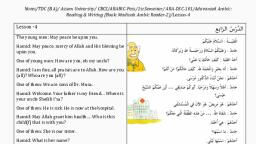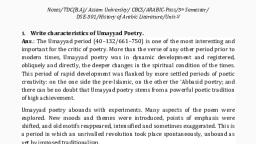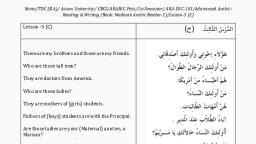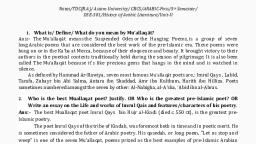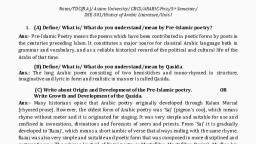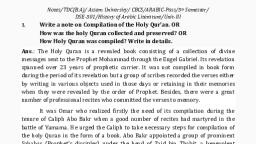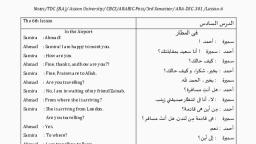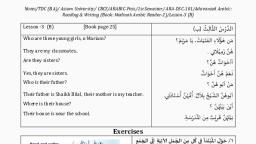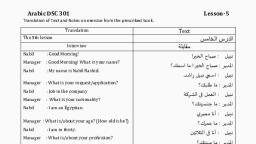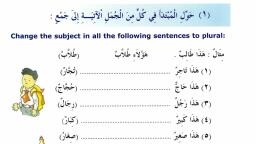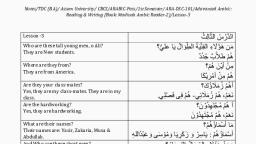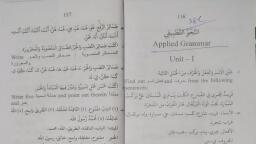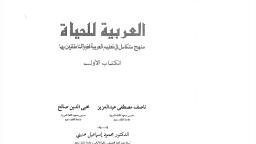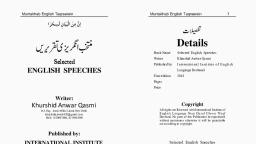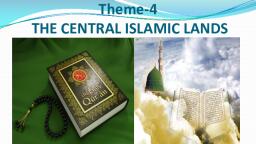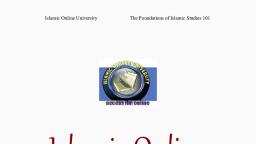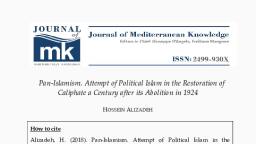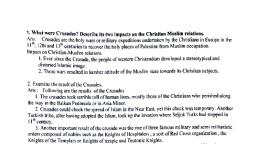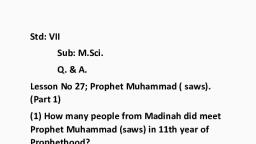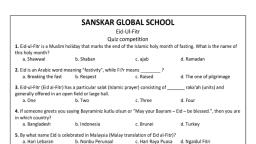Page 1 : Notes/TDC(B.A)/ Assam University/ CBCS/ARABIC-Pass/5th Semester/, DSE-501/History of Arabic Literature/Unit-IV, 1., , What are the characteristics of poetry of Early Islamic Period? Write., , Ans.: The rise of Islam in Arabia in the seven century A.D. brought about, tremendous changes in the social, political, intellectual, religious and economic life, of the Arabs. Impact of these overall changes felt in the Arabic literature in, common and in its poetry in specific. Automatically, the styles and contents,, themes and vocabularies underwent radical changes., A new kind of poetry known as ( شعر المخضرمينSha'r al-Mokhdharmin) made, its entrance in this era. It left an inerasable imprint in the history of Arabic, literature. Its exponents were the Islamic converts who associated themselves with, the Prophet, defended his cause with their verses and acted as his mouthpiece., They used their literary skill for Islam and their poetry bore the signs of Islamic, influence., The old Jahiliyya themes were discarded. The Gazal, undue praise, mockery,, false, boasting, description of wine, pagan gods, tribal fanaticism, the thirst for, revenge all were replaced by Islamic themes like; unity of God, piety, modesty, holy, war, paradise and hell. The style and structure of poetry were influenced by Quran, and Sunnah., Poetry was made subservient to the cause of propagation of the new, religion. Songs in praise of the prophet and his honour as well as the believers, became popular. Poetry was used to arouse passion against enemies and to wage, holy war against them. Death dirges were composed to celebrate the martyrdom of, Muslims who fell in the battle field., Quran and Hadith extinguished the flames of the old poetic zeal. The ban, imposed by the Quran on the poems calling for blood revenge and vindictiveness, resulted diminution and weakening in brilliancy of old poetic charm as Quran, decreased position of all crimes in the minds of the people., Islamic influences softened the style and diction in the poetry. The, eloquence of the Quran had captivated the minds of the poets. Quranic rhetoric, declined the vigor and vitality of the old system. The influence of Quran and, Sunnah was manifested well in the verses of the poets. The vocabulary of Quran, its, similes, terms, phrases, trials and judgments found in their way into their, compositions., **************, By- Dr. Abu Nazat Sayful Haque, (M.M., M.A., Ph.D., NET,), Asst. Prof, Dept. of Arabic, S.R. College,, Kalain, Cachar. 788815, E-mail:
[email protected]. M-9954863722 pg. 1
Page 2 : Notes/TDC(B.A)/ Assam University/ CBCS/ARABIC-Pass/5th Semester/, DSE-501/History of Arabic Literature/Unit-IV, , Who was the longest Mokhdarmin poet? OR Who is called Shai’run, Nabi? OR Who is Hassan Bin Thabit?, 2., , Write about his life and poetry./ Write some features/ characteristics of his, poetry./ Justify him as Sha’r al-Nabi/ Why Hassan bin Thabit is called Shairun, Nabi?, Ans.: Hassan Bin Thabit, a towering Mokhdharmin town poet. Born in Yathrib in, the clan Banu Najjar and have lived almost 120 years, of which 60 years were, before Islam. Being a professional poet living by poetry, in pre-Islamic days, he had, a good connection with Ghassanid Princes of Syria, on whose honour he composed, splendid odes and enjoyed their patronage and favour., After conversion, he became an ardent champion of Islam and defender of, the honour of the prophet. He was forefront of Islamic poets who responded to, prophet’s call to reply the enemies of Islam through verses. He paid the satirists on, their own coins. The prophet appreciated his poetic intellect and more often asked, him to recite poems climbing in the pulpit of holy masjid for lampooning Quraish, who maligned Islam and the Prophet. He was known as Shairun Nabi (the poet of, the prophet) and was one of the closest disciples. His poetic carrier seems to have, ended with the demise of the prophet because after his death he hardly composed, verses. As a satirist he was a great success because enemies feared his bitter, tongue., His diwan comprised over 1000 verses, some of which are later time, forgeries by Umayyad. Many critics argued that his later (Islamic) verses did not, reach the level of excellence attained by him in earlier (Jahiliyya) verses., Features/ characteristics of his poetry:, His later poems, due to Islamic influences, contained terms and ideas and, quotation from Quran. However, he is credited with initiating a new branch of, poetry on “praising of the prophet” in which he himself was the master. His, expression in the poetry on the whole is very clear and dignified and even elegant., His poetry before Islam was hard of language and bristling with unfamiliar words., His theme breathes a pleasant freshness. He composed verses on all types of, Arabian poetry- elegy, satire, ghazal, praise, wine, self-glorification, song and revel., **********, , By- Dr. Abu Nazat Sayful Haque, (M.M., M.A., Ph.D., NET,), Asst. Prof, Dept. of Arabic, S.R. College,, Kalain, Cachar. 788815, E-mail:
[email protected]. M-9954863722 pg. 2
Page 3 : Notes/TDC(B.A)/ Assam University/ CBCS/ARABIC-Pass/5th Semester/, DSE-501/History of Arabic Literature/Unit-IV, 3., , Who is Al-Khansa? Write features/ characteristics of her poetry., , Ans.: The most famous Mokdarimin poetess Tumadir bint Amr bin Sharid, known, as Al-Khansa, was born to the clan of Sulaim in North Arabia. She became, renowned for her high ranged elegies that she mourned on the death of her two, beloved brothers; Shakr and Muwaiya, who were noted for their horsemanship, and bravery., Mixed with noble qualities and poetic mind she conveys a sublime tone and, dignified worth. Being a beautiful woman of a noble descent she was proposed to, marry by many dignified warriors. Rejecting all of them she married from her own, people, thrice, and bore for last one six children. All of them were poets with, dignity. Four of the sons were martyred in the war Qadsiyya. When she heard the, news of their death she thanked Allah very bravely for honoring her by their, martyrdom and hoped to be united with them in the adobe of His blessings., Characteristics/ features of her poetry:, She was incomparable poetess of Mukdarimin period. Her verses were, marvelous, full of high emotion and touching to the core of the hearts. Her elegies, were the outcome of grief and hearty sufferings. The tone of her verses was, dignified, sober, sweet and smooth and tinged by deep tone of sadness. The ideas, were clear, true in sentiment. She devoted most of her verses, one thousand, to, eulogies her brother Shakr and praise his qualities. Her poems are descriptive of, every aspect of qualities of Shakr and his attitude in war and peace. All of her, poems start invariably with a call the eyes to shed copious and unrelenting tears., Her poetry was marked for its sorrow and mournful tone. She has been, compared often to a wailing turtle dove perched on the branch of a tree of a mate., She died in the year 24 A.H. in the formative years of the rule of the third Caliph, Othman., ******************, , By- Dr. Abu Nazat Sayful Haque, (M.M., M.A., Ph.D., NET,), Asst. Prof, Dept. of Arabic, S.R. College,, Kalain, Cachar. 788815, E-mail:
[email protected]. M-9954863722 pg. 3
Page 4 : Notes/TDC(B.A)/ Assam University/ CBCS/ARABIC-Pass/5th Semester/, DSE-501/History of Arabic Literature/Unit-IV, , 4., , Who is Ka'b bin Zuhair? Write a note on the life of Ka'b bin Zuhair and, his poetry., , Ans.: Ka'b bin Zuhair was born and brought up in Ghatfan tribe in the clan of, Muzaina which had distinction in producing of a galaxy of illustrious poets. He got, training as poet from his father Zuhair,, His Pre-Islamic poetry is marked by the heroic age attitude which later;, after accepting Islam, gave way to religious morals and principles. Like his father,, he was also a perfectionist, interspersed with maxims and proverbs. His poetry is, faulted for ambiguous expression., Before accepting Islam, he was one of its bitter foes. In a satire he ridiculed, his brother Bujair for accepting Islam and defamed Abu Bakr and the Prophet by, portraying them as drunkards. Reacting to this he was ordered to be killed., Therefore, he sought asylum with Abu Bakr. Thus, he was given pardon. Then he, recited the splendid ode Banat Suad which won him amnesty of the Prophet. This, Qasida is also known as Qasidatul Burdah as the Prophet presented him with his, Shawl (Burdah) as a mark of appreciation., In his amatory verses his father Zuhair’s influence is noticed. Following the, traditional path, he mentions the love lust heart in his qasida. Islamic influence is, evident in his poems. God’s infinite kindness and substance, Prophet’s charity and, his sayings, seldom etc. echoed in his later poems., ****************, , By- Dr. Abu Nazat Sayful Haque, (M.M., M.A., Ph.D., NET,), Asst. Prof, Dept. of Arabic, S.R. College,, Kalain, Cachar. 788815, E-mail:
[email protected]. M-9954863722 pg. 4

